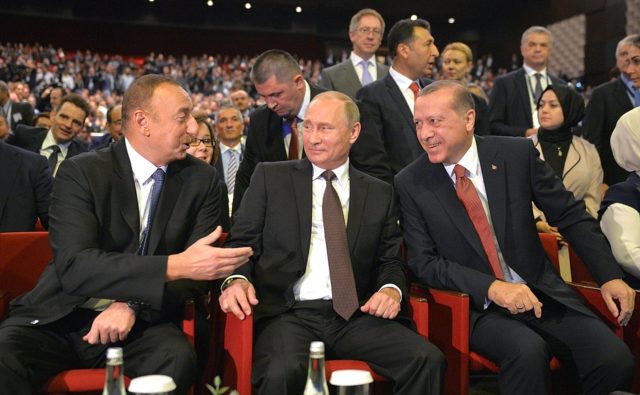
Azerbaijan Strengthens Its Energy Position in Turkey
Publication: Eurasia Daily Monitor Volume: 13 Issue: 168
By:

Top decision makers, opinion leaders and CEOs of the world’s largest energy companies, including BP, Gazprom, Shell and Total, convened in Istanbul, on October 9–13, for the 23rd World Energy Congress. High-level officials, including 56 ministers from various countries around the globe, also attended the event. The Energy Congress agenda focused on future scenarios in the energy markets, bringing together businesses and policymakers, as well as addressing the necessary institutional changes to meet looming energy-sector challenges. The event’s host, meanwhile, hoped to use this occasion to raise Turkey’s regional profile in the energy sphere (World Energy Congress, October 9).
Among the Congress’s most notable visitors was Russian President Vladimir Putin. His attendance in Istanbul marked the first high-level Russian government official’s visit to Turkey since October 2015, when the Turkish air force shot down a Russian bomber that had violated Turkish airspace. According to some experts, the face-to-face meeting of the Russian and Turkish presidents during the Congress was the most important outcome of the entire event. During their discussions, Russian President Vladimir Putin and his Turkish counterpart, President Recep Tayyip Erdoğan, touched upon continued energy cooperation, including on the proposed Turkish Stream natural gas pipeline. Moreover, the two countries’ energy ministers signed an intergovernmental agreement on the implementation of Turkish Stream. The project envisions the construction of two gas lines from Russia, across the Black Sea floor (660 kilometers), via the European part of Turkey (250 km), and terminating at the Turkish-Greek border. Each line would transport 15.75 billion cubic meters (bcm) of gas. One of the lines is intended to deliver gas to Turkey while the other would branch off toward the Turkish–European Union border to carry gas to Europe. The cost of the project is estimated at $6 billion. Both lines are supposed to be completed by December 2019 (Contact.az, October 11). President Putin stressed that the agreement reached in Istanbul would allow Turkey to become a major regional energy hub.
Azerbaijan, which is closely monitoring the progress of Turkish-Russian relations, was also represented at the Congress at the highest level, with President Ilham Aliyev in attendance. This marked the Azerbaijani president’s first trip to Turkey since the July 2016 coup attempt against Erdoğan’s government. During the visit, Aliyev lauded the warm relations between both countries. “I once again express gratitude to you. This is my fourth visit to Turkey this year. My dear brother Recep Tayyip Erdoğan also pays visits to Azerbaijan. Our friendship, our unity and our brotherhood is permanent, eternal and indestructible,” Aliyev said (APA, October 10). The Azerbaijani leader noted that his country was investing around $20 billion in Turkey’s energy sector, including projects related to the South Gas Corridor, which will carry Azerbaijani natural gas across the South Caucasus and Turkey to Southeastern Europe (Azertaj, October 11).
Meanwhile, the State Oil Company of Azerbaijan Republic (SOCAR) also sought to reach some important deals at the World Energy Congress. During the event, Russian Rosneft and SOCAR Turkey Enerji (a subsidiary of SOCAR) signed a joint oil supply agreement. Specifically, the two sides pledged to supply 10 million tons of Russian oil to Star Refinery, located in Turkey. The construction of this refinery is being conducted by SOCAR Turkey Enerji; the project is one of the largest Azerbaijani investments in Turkey. A separate agreement laying out the terms and conditions for this oil supply deal has yet to be signed (Contact.az, October 10).
In addition, during the Congress, SOCAR agreed to purchase Austrian energy giant OMV’s oil terminal located in Izmir, Turkey. The capacity of the terminal is about 200,000 cubic meters, but it can be increased to 700,000 cubic meters. Earlier, SOCAR had also expressed interest in buying OMV refueling stations in Turkey, which would be repurposed into a distribution network for the Azerbaijani oil producer’s Star Refinery, once it is complete (Today.az, October 1).
The gas pipeline deal struck between Turkey and Russia does not particularly worry Azerbaijan or its corporate Southern Gas Corridor partners. Baku views the Ankara-Moscow energy talks as a supplemental step being taken by the Turkish government to transform Turkey into a regional energy hub. Moreover, the Turkish gas market is growing every year, and Azerbaijan is confident it will still be able to find a suitable niche for its energy exports in both Turkey and Europe. BP’s CEO, Robert Dudley, stated during the Energy Congress that his company was actually interested in joining the Turkish Stream project, despite its active involvement in the rival Trans-Anatolian Gas Pipeline (TANAP—a key link in the Southern Gas Corridor), currently under construction. BP holds a 12 percent share in the TANAP project (Azertaj, October 12).
Moreover, Turkey does not intend to give up on the Azerbaijani-led TANAP despite moving forward on Russia’s Turkish Stream. Turkish Prime Minister Binali Yıldırım stated during the Istanbul energy conference that his country fully intends to implement TANAP. His remarks were reiterated by Saltuk Düzyol, the head of the TANAP consortium, who stated that Turkish Stream is not a competitor to TANAP. He argued that TANAP is significantly more beneficial, since unlike Turkish Stream, TANAP actually opens new routes to Europe and promotes the diversification of energy sources for European customers. The consortium head also pointed out that the first gas through TANAP will be delivered to the Turkish city of Eskişehir by June 2018. That is almost one and half years earlier before Turkish Stream can be expected to come online (Trend, October 13).
Overall, the World Energy Congress in Istanbul served as an important opportunity for Azerbaijan to secure its position on the Turkish market. For now Baku is confident that the developing Russian energy deals with Turkey will not undermine Azerbaijan’s trans-regional energy strategy.



